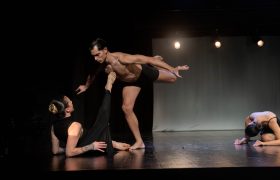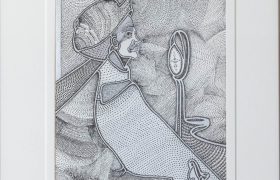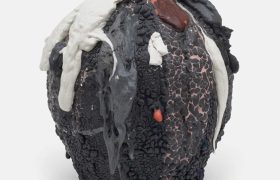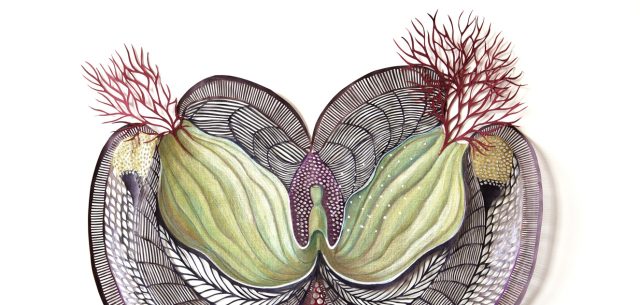Smyrna: a poignant tale of loss and belonging
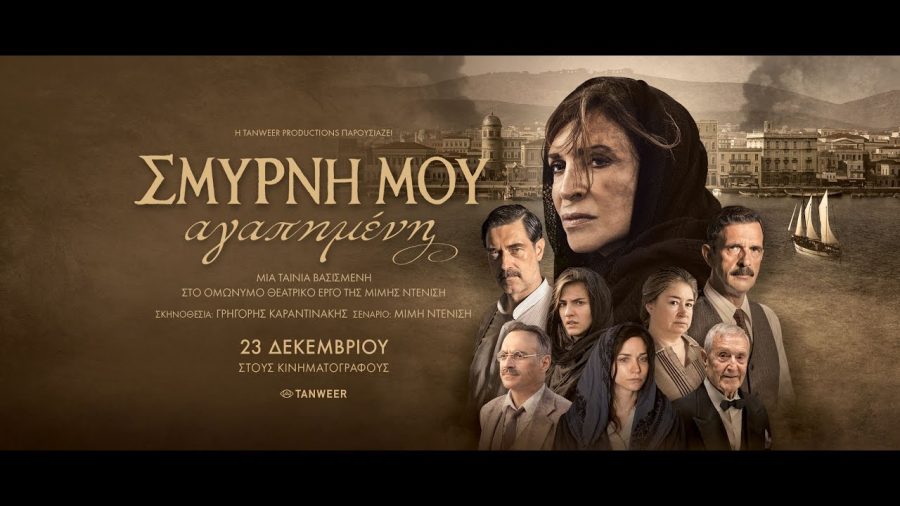
100 years on from of the Destruction of Smyrna, an epic and powerful film tribute entitled ‘Smyrna’ premieres in Greek cinemas on December 23. Elena Panayides speaks to actress Nedie Antoniades about her emotional voyage embodying the role of Angelica, from its successful two-year theatrical staging in Athens, to the ambitious, international film adaptation by Mimi Denissi.
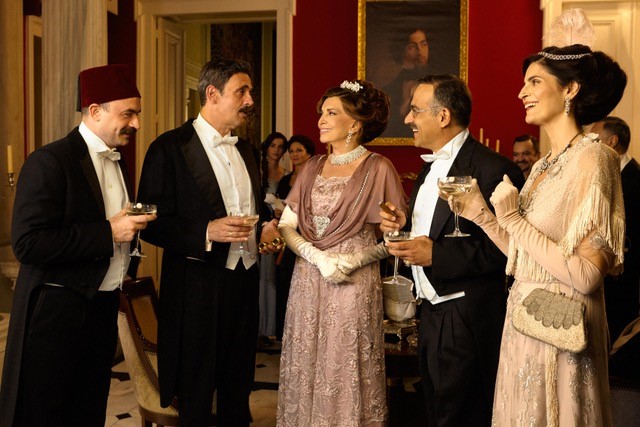
Smyrna celebrates the cosmopolitan character of the city as a thriving hub of Greeks, Turks, Jews, Armenians and Levantines living together harmoniously, and pays tribute to the 100 years since its destruction. The film traces the story of Filio, an American lady visiting Lesbos with her granddaughter. Filio’s own family had come to Mytilene from Smyrna as refugees following the Asia Minor disaster.
Tell me about your journey in the role of Angelica written by Mimi Denissi. You were in the theatrical performance as well. How did the role come to you?
It’s been a journey of nine years. When I first met Mimi about ten years ago she was just at the beginning of thinking this is an important story to tell. I was blown away with her historical research.
One summer evening a couple of years later, she said to me “I’ve got this part for you and I think it would be a good fit.” I read the play and thought “I have to be a part of it,” in spite of the difficulties of living in Cyprus and working in the theatre in Athens. It was challenging and fulfilling, and over 100 performances later, it remains to this day one of the most creatively challenging and greatest learning experiences I’ve had on stage.
When it was going to become a film and my name was thrown into the pool of actresses who were up for the part of Angelica; and I was lucky enough to transfer this part from stage to film, along with the actor who had played my husband Krateros Katsoulis, who was also cast in the play and film, which made it easier to fall back into the part. It was a gift to get to revisit the character of Angelica, the relationships within that family, the dynamics of that world. It was a great gift under amazing circumstances production levels I experienced filming it in Lesbos and in Athens, where grand sets were built to replicate the quay of Smyrna. I think it was unprecedented not just for me, but for all the actors that participated. It showed what Greece is capable of producing. To see the finished product at the premiere in Athens, was the culmination of a very long journey – a bittersweet goodbye to Angelica.
How did your stage performance inform your on-screen performance. Where you carrying that earlier experience with you?
The background story of who this woman is and how her life was, was something that I’d already worked on. I think those of us in the stage production where very lucky because it was easier for us to fall into that world of Smyrna, because we’d existed in it for so long. So, it wasn’t hard to get into the world, but the challenge is that the stage demands one thing and the screen another, so a different set of tools are necessary. It was interesting to me to learn how to adjust those tools to bring the same character to life through a different medium.

There’s a stellar international cast including Susan Hampshire, Rupert Graves, Jane Lapotaire, Burak Hakki, Ozdemir Ciftioglu, Tamilla Kulieva, Giannis Vogiatzis – an ensemble of English, Turkish, Armenian and Greek actors who spoke in their languages. What was it like navigating between all those languages?
For me personally it was perfect, because I grew up bilingual, so for once I felt like “this I know, I don’t have to stick in one language.” I think what’s interesting about the script by Mimi Denissi in collaboration with Martin Sherman, and the film directed by Grigoris Karantinakis, is that the multiple languages are used to reflect that Smyrna was a melting pot. It puts you into that world and language feels like the ideal vehicle to highlight that.
To be working with so many different actors and actresses was fantastic, as everyone brought something different of their culture to it. Even further, the fact Turkish actors were used for the Turks, British for the Levantines, Greeks for the Greeks, French for the French was all part of the authenticity.
What do you hope the audience takes away from this epic, historic and tragic film?
I can tell you what I took away from it, especially after the premiere, as it’s so different to read the script, to be in it and then to experience it as an audience. Watching it, the one thing that really stood out to me, which is important to me when selecting projects, was how the Great Powers and political events play with peoples’ lives.
Beyond that, the film follows a woman’s perspective, the life of Filio Baltazi, and her family, throughout these historic events. What I saw, was how the decisions of the Great Powers, within rooms of men, affect and create the victims of war. We need to be aware of the level in which women are affected by war and their lack of a voice in those rooms to this day. The female characters in the film are smart, strong, knowledgeable but are not allowed to be part of the conversation or to have an opinion. Their voice is dismissed, but at the end of the day they are the victims.
This was an ethnic cleanse, a city was burnt to the ground, Greece was closed off to a whole population which wasn’t allowed to be Greek or Turkish at a moment they were being persecuted. Beyond that, the film tells a greater story of the female experience of war.

Regarding the feminist perspective; I love your IG description of yourself as: An actress, mummy, feminist; co-ordinator of school runs, menu plans, call sheets and showtimes. You do a lot of work in Cyprus with a group, SEZON Gynaikes – Project Season Women, tell us more.
Project Season Women was created as a reaction to the fact that along with the co-founders Magdalena Zira and Athina Katsiou – two very accomplished directors, there is a marginalisation of the female experience in the theatre and in the cultural works that are produced in Cyprus and Greece. So, we created a theatre collective which promotes the female narrative. We started in 2019 and built momentum which led to performances at London’s British Museum, of Natalie Hayne’s retelling of Greek myths from the female perspective.
We’re investigating more local female stories and creating works from them. Now, thanks to a generous research and development grant from the AG Leventis Foundation, we have ability to do the work the way it’s meant to be done. We’re telling the story of a grassroots movement ‘Women Walk Home’ that started in 1975. It was the effort of a small group of women to highlight the fact that after the 1974 invasion of Cyprus by Turkish troops, there was no longer freedom of movement within your own country. This movement gave birth to five marches until 1989, when they even took over the Acropolis. Most people have never heard of this, and we wondered why, so in the Autumn we plan to premiere a new play, based on the verbatim testimonies of the women that participated.
You juggle many roles, is there such a thing as a work / life balance?
I’m not juggling many things, all these things are my identity, none of us are just one thing. Day to day life is being a mother of two, a wife, a friend, a professional, an actress, a producer and a writer. If I take a step back and look at the entire picture of the last 20 years, what has worked is that at times work overtakes life and other times vice versa.
You’ve always surrounded yourself with strong, dynamic and vocal women such a Mimi Denissi. Who has mentored and inspired you?
There are so many women that I’m lucky to have had in my life, as friends and family. I am privileged to have worked with someone such as Mimi, who I admire for her ability to write, produce, act, and make important works happen. You cannot be in her presence and not absorb some of that. She does it seamlessly and makes it look effortless. Being around her has helped me find my own voice and recognise how important it is to share that with like-minded creators, I am very lucky to be working with people who inspire me all the time.
I’d like to take you further back. You were born in Washington and have lived in Nashville, New York, LA and Cyprus and went to college in Boston. How did this hybrid, melting pot upbringing inform you?
The first culture shock was moving from my summer holiday place – Cyprus, to living there as a child in the 80s, where there weren’t things like McDonald’s and TV started at 5pm, whereas in the States you had cable! The second shock was when I started to work there, because it had a less rigid structure, compared to what I had been accustomed to at the time. It took a while to adjust, but nowadays in Cyprus and Greece, so many directors and actors train overseas, so you see an amalgamation of techniques.
When did the acting bug bite you?
I was 8, and we had an amazing teacher at school in Nicosia, Cyprus who was an artist called Glyn Hughes. He would improvise the myths and we’d act them out. I became aware of the rush of liking where I was at. That was my moment of awareness, not that I would be an actress for the rest of my life, but that I felt at home.

It feels like an exciting time in Greece, with international and local film and TV productions, are you excited about the future? Do you think that an artist’s life is a solitary and difficult one with opportunities being a matter of chance, happenstance, location and hard work?
I think it’s a matter of all of those put together to be honest. I think that Greece has been on the cusp, it was an untapped resource, and this is not the case anymore. If I learned anything from my experience in ‘Smyrna’ and working with a production company like Tanweer, it’s that Greece has the talent, the capability the know-how to take anything on. The exceptional workforce exists; whether cast, crew, or creatives. I’m really excited to see where this goes, it’s truly an exciting time. It’s also time that Greece takes its place in the international film arena and stands equal to other countries.
It’s the end of your personal journey with ‘Smyrna, My Beloved’ but the beginning of the audience’s journey, with the film premiering in Greek cinemas on December 23rd, 2021. How does that make you feel to hand it over to the public?
It’s really hard to resign anything, because I’ve been lucky enough to revisit this character, it’s been hard to let go of it a second time. It was wonderful to swim in her world again and what’s fantastic is that it’s there forever now. It’s a very universal story, its strength is that it’s a story that belongs to many. It belongs to all displaced peoples and sadly displacement has not ceased, so I’m very proud to be a part of a story needs to be told, but now belongs to others.

